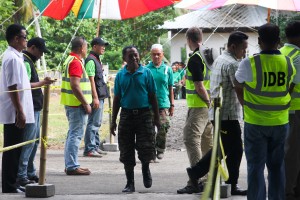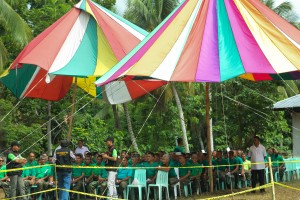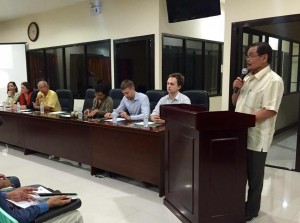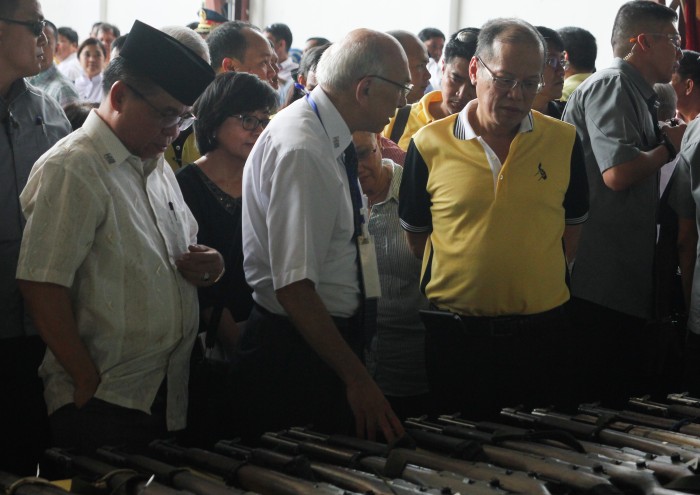What next in the Mindanao peace process?
Emma Leslie & Kristian Herbolzheimer
The non-passage of the Bangsamoro Basic Law (BBL) by Congress did not come as a surprise. It was a scenario foreseen by many since early after the Mamasapano tragedy in January last year. In fact, given the risks that Congress might enact a law that was not compliant with the Comprehensive Agreement on the Bangsamoro (CAB), there was a shared understanding by stakeholders in the peace process that “no BBL is better than a bad BBL”.
And yet the non-passage has come with a heavy toll for all. It has led to deep disappointment and frustration at all levels, from the government and the Moro Islamic Liberation Front (MILF) negotiating panels down to the grassroots. And it has opened up the fundamental question of what next?
It is clear that the political aspect of the peace process enters a period of hibernation: no major decisions on solving the Bangsamoro issue are expected at this final stage of the Aquino administration. Without a BBL there will be no plebiscite, no transitional authority, and no abolition of the Autonomous Region in Muslim Mindanao (ARMM). Consequently, the decommissioning of MILF combatants and weapons is also put on hold, as the next phase is conditional to the enactment of the BBL.
 Taking stock of achievements
Taking stock of achievements
This immense setback may lead many to wonder whether the peace process has achieved anything? Whether it is back to square one?
The reality is that the prospects for peace in the Bangsamoro today are far better than they have ever been before. The Framework Agreement on the Bangsamoro (FAB) signed by the two parties in October 2012 and the Comprehensive Agreement on the Bangsamoro (CAB) signed on 27 March 2014 are here to stay. Both documents frame a win-win scenario, as they articulate the needs and expectations of the people in the Bangsamoro, as well as the structural reforms the central government feels are necessary to consolidate a more inclusive and cohesive nation.
Another development that cannot be overstated is the unprecedented explicit support to the peace process by a number of key stakeholders: the military, the business sector, the Catholic church and the international community are strong champions of the CAB, and key promoters for the resumption of agreement implementation during the next administration.
At the same time the multiple consultations during the drafting of the BBL, and the subsequent discussions in Congress have had two positive effects. On one hand people in the Bangsamoro have a better understanding of the content of the BBL and the envisioned change it will bring about. And in conducting their awareness-raising and advocacy campaigns, civil society activists are themselves much better equipped to articulate their needs and expectations; they also have a better understanding of the limitations of the national legislative process and, thereby, a clear vision of how different the regional legislative should be. In other words, the advocacy activities over these past months have significantly increased the social capital of the Bangsamoro and its allies in the rest of the Philippines.
 The Bangsamoro stage of the peace process
The Bangsamoro stage of the peace process
While the ball is currently in the government’s court, it might also be relevant to re-frame the situation and consider the challenges from a different, more empowering perspective.
Several years ago, the MILF framed the peace negotiations as taking place first under adomesticstage (direct peace talks, 1997-2000), and later under adiplomaticstage (facilitated negotiations in Kuala Lumpur, since 2001).
After the signing of the CAB the peace process has probably entered a Bangsamoro stage.
The fundamental game-changer of the CAB is indeed that the Bangsamoro people are to take on the responsibility to lead the transformation of their society relying primarily on themselves.
Had the BBL been passed, an all-Bangsamoro Transition Authority (BTA) under the leadership of the MILF would be in charge of the transition from the ARMM to the Bangsamoro entity. In this journey, the BTA initially, and the Bangsamoro government shortly after, would take on the huge responsibility of managing the devolved power and responding to the expectations of their people.
This scenario has now been prevented by the lack of progress in Manila. It may therefore sound futile to discuss the challenges of Bangsamoro transition in the absence of a BBL. And yet a successful resumption of the peace process would bring this agenda back sooner than expected. With a CAB-compliant BBL in place, the responsibility of good governance transfers from the central government to the Bangsamoro. And that is a major paradigm shift that requires comprehensive preparation.
Security challenges
The most immediate concern is the increase of security risks. Two circumstances coincide in time: militant sectors opposed to the peace negotiations may increase their activities to assert their presence and attract sectors of the disenfranchised population. There are alarming signals that suggest a new level of complexity in the Mindanao context as the global call to join Islamic extremist violence might get traction in some quarters. The lines between political, criminal and religious violence may thus get even further blurred.
At the same time the May presidential, legislative, regional and municipal elections are likely to trigger the recurrent episodes of violence that are sadly characteristic during electoral periods.
Under these circumstances the existing ceasefire mechanisms are fundamental, essentially to prevent the armed forces and the MILF from getting dragged into direct confrontation. It might be worth considering strengthening the capacities of the International Monitoring Team (IMT), the Coordination Committee for Cessation of Hostilities (CCCH) and the Ad Hoc Joint Action Group (AHJAG). More people and more resources will be needed to allow these three bodies to increase their conflict prevention and resolution capacities. It is also worth assessing the options to bring back to life other mechanisms such as some of the Local Monitoring Teams, or the local NGOs in the Civilian Protection Component of the IMT.
Civil society organisations are again called on to play a fundamental role. Their expertise in preventing and addressing family feuds, in promoting dialogue and trust across divided communities, in documenting stories of hardship and injustices among all communities, represents a fundamental know-how that needs to be mainstreamed and scaled up in order to widen its impact.
 From problem to opportunity
From problem to opportunity
The current situation is certainly complicated for a revolutionary organisation like the MILF. It is the nature of the asymmetric power-relations between insurgencies and governments that if the latter does not deliver, the former seems left with few other options than to strengthen its internal capacities and wait for new opportunities. This puts the MILF in a difficult position, as some of its constituency will challenge the wisdom of this approach.
And yet it is in these times of uncertainty that the MILF has a chance to once again assert its leadership capacities and statesmanship vision. During these past months the MILF has emerged as a trustworthy partner for those in government committed to change, as acknowledged by government chief negotiator Miriam Coronel-Ferrer in her opening remarks in Kuala Lumpur last month. International diplomats share the same perception. This legitimacy is today the MILF’s strongest leverage force.
The Bangsamoro is facing a double transition: from war to peace, and from one administration to the next. This might also be a time for the MILF to plan its own transition. The main challenge ahead is not necessarily the passage of the BBL, but the forging of unity within the diversity of the Bangsamoro. The chances of success in implementing the CAB will increase with the number and diversity of the people standing behind the same claim.
The MILF has taken the lead in the Bangsamoro negotiations over these past years. Without claiming they represent all the peoples in the Bangsamoro, they have been the champions for a cause aimed at benefitting all. They have been patient, smart, unabated and unwavering in their struggle, on the ground and at the negotiations. This is widely acknowledged, in the Bangsamoro and beyond. The CAB is the reward.
The time is now ripe to build on these gains and broaden the ownership, merge the efforts with all the peoples in the Bangsamoro, beyond the MILF constituency. The next administration plays a vital role in the future of the political process. But looking at the bigger picture, the future of the Bangsamoro is essentially in the hands of its own peoples.
Emma Leslie ([email protected]) is the Executive Director of the Centre for Peace & Conflict Studies. Emma is also a programme associate with Conciliation Resources. Kristian Herbolzheimer ([email protected]) is the director of the Transitions to Peace Programme with Conciliation Resources. Conciliation Resources has been a member of the International Contact Group in the Bangsamoro Peace Process since 2009. This article originally appeared in the opinion section of Mindanews on March 5.

